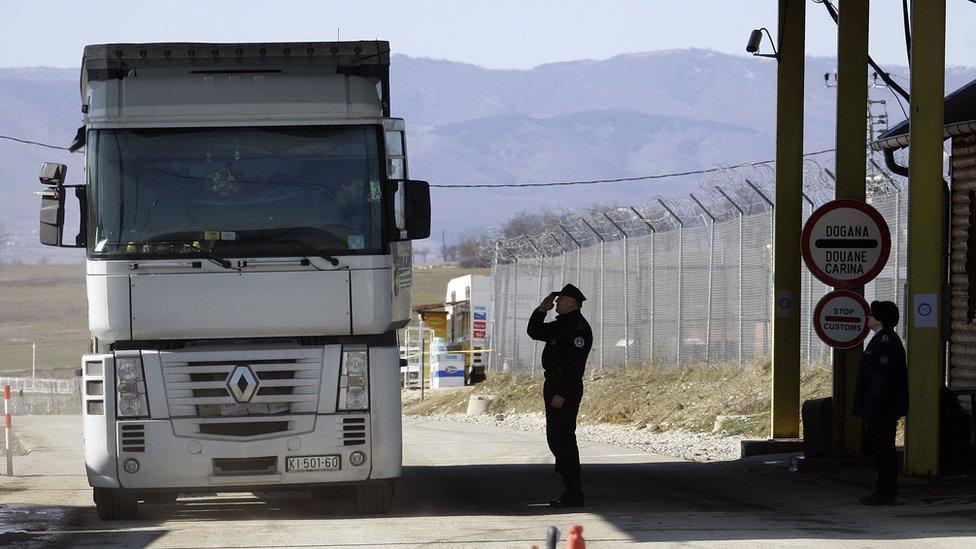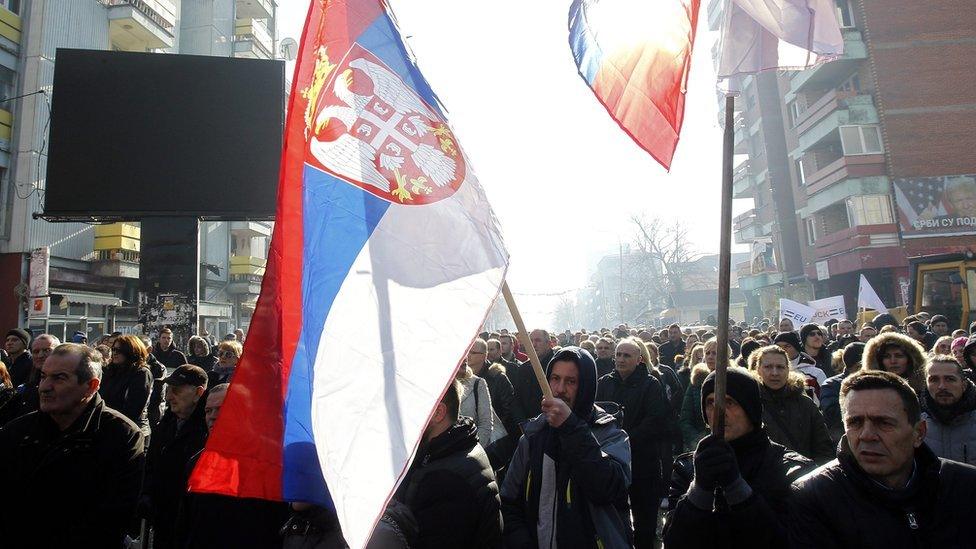Kosovo hits Serbia with 100% trade tariffs amid Interpol row
- Published

The tariff hikes are likely to bring trade between Kosovo and Serbia to a halt
Kosovo has slapped 100% customs tariffs on Serbian imports, blaming the government in Belgrade for its latest failed bid to join international police organisation Interpol.
Serbia immediately warned that the decision would bring all trade to a halt and the EU said the decision had to be revoked immediately, external.
Kosovo seceded from Serbia in 2008 but is not recognised by Belgrade.
But both are part of the Cefta Balkan free-trade area.
How did the trade row start?
Tensions between the two neighbours spilled over on 6 November, when Kosovo imposed an additional 10% customs tariff on Serbia and Bosnia-Herzegovina, for conducting an "aggressive campaign".
Kosovo was angered by the decision of a succession of small states to reverse their recognition of its independence, and accused Belgrade of orchestrating the moves.
More than 110 nations do recognise the majority-Albanian republic, but Russia and some EU member states including Spain and Greece do not.
After Interpol's general assembly rejected Kosovo's third bid for membership in three years on Tuesday, Kosovo complained of a "fierce campaign" conducted by Serbia against the idea of normalising relations with its former province. Kosovo had spent a reported €1.2m lobbying for Interpol membership.
Serbian officials were thought to be concerned that once a part of the police organisation, Kosovo would start seeking the arrest of commanders suspected of war crimes during the 1998-99 war.
Kosovo hit back on Wednesday, hiking the tariffs to 100% for Bosnia as well as Serbia. Authorities were also told to remove some products from shelves if they did not refer to the Republic of Kosovo.
Allow X content?
This article contains content provided by X. We ask for your permission before anything is loaded, as they may be using cookies and other technologies. You may want to read X’s cookie policy, external and privacy policy, external before accepting. To view this content choose ‘accept and continue’.

How significant is the row?
Kosovo imports some €400m (£350m; $450m) worth of goods from Serbia a year, so the decision to effectively bring that trade to a halt will harm both sides.
President Aleksandar Vucic convened a meeting on Wednesday of Serbia's National Security Council to consider a response. "We will react rationally, calmly and responsibly," he said afterwards, Serbia's B92 website reported. He is also due to meet Kosovo Serb leaders on Thursday.
Although relations have nose-dived, the two sides have been involved in EU-led talks to normalise relations. EU foreign policy chief Federica Mogherini hosted a meeting earlier this month involving the Serb leader and Kosovo President Hashim Thaci.
As recently as September, there was intense speculation that the two sides were considering a potential land swap to end the stalemate between them.
In her statement on Wednesday, Ms Mogherini said the Kosovo trade tariffs were a "clear violation" of the Cefta trade agreement which takes in eight other Western Balkan countries.
"The Kosovo government has to immediately revoke these decisions," she said.
An EU official said they wanted the measures withdrawn quickly so work could continue towards normalising relations, a precondition for both sides for entering the European Union.
- Published6 September 2018
